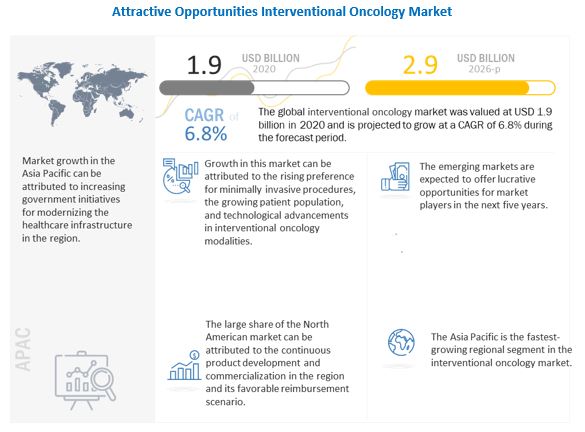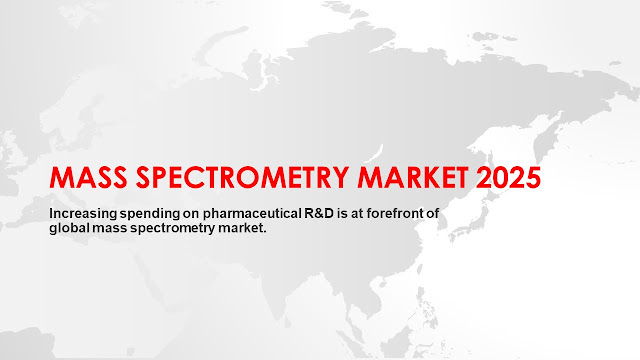Interventional Oncology Market Size, Industry Trends, Key Players and Forecast
This report aims to provide detailed insights into the global
interventional oncology market. It provides valuable information on the type,
procedure, application, and region in the market. Furthermore, the information
for these segments, by region, is also presented in this report. Leading
players in the market are profiled to study their product offerings and
understand the strategies undertaken by them to be competitive in this market.
Don't
miss out on business opportunities in Interventional
Oncology Market
Revenue
Growth Analysis:
[215 Pages Report] The global interventional oncology
market size is projected to reach USD 2.9 billion by 2026 from USD 1.9 billion
in 2020, at a CAGR of 6.8%
Download PDF Brochure:
https://www.marketsandmarkets.com/pdfdownloadNew.asp?id=203687164
Key
Factors Driving Market Growth:
The global interventional oncology market
offers significant growth potential for prominent as well as emerging product
manufacturers. Technological advancements, rising incidence of oncology and
increased funding and public-private investments are some of the key factors
driving the growth of the market.
The embolization devices segment to witness the highest share in
interventional oncology industry
In 2020, embolization devices accounted for a
share of the interventional oncology Industry. Embolization devices include
non-radioactive embolic agents and radioembolic agents. Although these devices
are primarily employed to treat hepatocellular carcinoma, their use has been
widely extended to various other forms of cancer. These devices are used when
tumors cannot be treated using ablation techniques and in cases where the tumor
size is large. They are also used in palliative procedures and as a pre-operative
procedure to improve the outcome of liver resection.
Embolic agents include radioembolic agents and non-radioactive embolic agents.
Non-radioactive embolic agents include gelatin foam, tris-acryl gelatin
microspheres, and polyvinyl alcohol (PVA). Gelatin foam is a non-radioactive
embolic agent and is considered a temporary embolic agent whose effect is
relatively shorter. Other non-radioactive embolic agents are considered
permanent agents whose effects are seen for a longer period.
Liver cancer segment to register the highest CAGR in the
Interventional Oncology Industry, by application, during the forecast period
Liver cancer accounted for the
largest share of the interventional oncology market in 2020. Interventional
oncology plays a crucial role in treating liver cancer, as removing the tumor
with surgery may not leave the tissue healthy enough for effective liver
functioning. Thus, primary liver tumors or liver tumors resulting from
metastatic cancers can effectively be treated using interventional oncology
procedures. Owing to this, more than half of all treatments for primary and
metastatic liver cancer are conducted using interventional oncology.
Regional Growth Analysis:
The Asia Pacific market to grow at the highest
CAGR during the forecast period.
The interventional oncology market is segmented
into five major regions, namely, North America, Europe, Asia Pacific, Latin
America, and Middle East & Africa. Government efforts to increased funding
, supportive regulations for the development and commercialization of advanced
interventional oncology products, rising healthcare expenditure, increasing
number of hospitals and clinics in India and China, expanding research base
across India, China, and Japan, and the increasing incidence of surgeries are
the major factors driving the growth of the APAC interventional oncology
Industry.
Request Sample Report:
https://www.marketsandmarkets.com/requestsampleNew.asp?id=203687164
Key Players:
The major players operating in the Interventional Oncology Market are Medtronic (Ireland), Boston Scientific
(US), BD (US), Terumo (Japan), Merit Medical (US), AngioDynamics (US), J&J
(US), Teleflex (US), Cook Medical (US), HealthTronics (US), MedWaves (US),
Sanarus (US), IMBiotechnologies (Canada), Trod Medical (US), IceCure Medical
(Israel), Mermaid Medicals (Denmark), Interface Biomaterials BV (Netherlands),
Guerbet (France), ABK Biomedical (Canada), Shape Memory Medical (US), Endo
Shape (US), Monteris Medical (US), Instylla (US), Trisalus Lifesciences (US),
Profound Medical Corp (Canada), Sirtex (US), Accuray (US), Baylis Medical
(Canada), and ALPINION MEDICAL SYSTEMS (South Korea).




Comments
Post a Comment